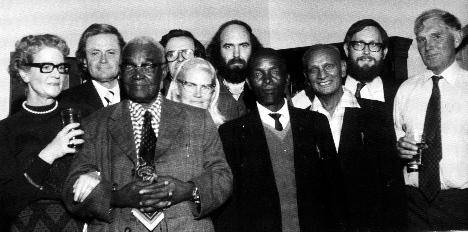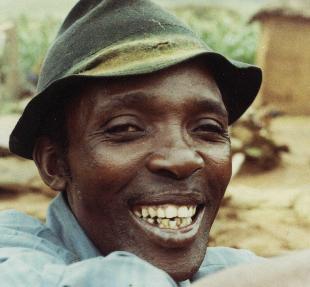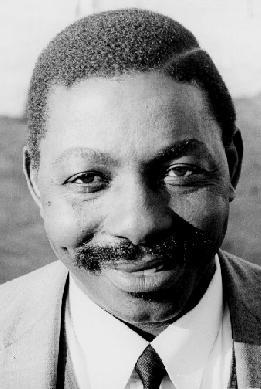

The material on this site has already been moved to
where you will find updated versions of this and other pages.
If you have linked to this page, please change your link to the new site.
During the apartheid era in South Africa many opponents of the National Party regime were "banned" -- that is, restricted from being in (or away from) certain places, belonging to certain organizations, and doing certain things. Banning was used against many opposition political parties and groups. People who were banned included political prisoners who had served their sentences, trade union activists, and members of churches and NGOs, especially those whose activities brought them into contact with people belonging to differtent ethnic groups. Among those who were banned were many members of the Liberal Party of South Africa
The Liberal Party of South Africa was founded in 1953, and for fifteen years worked for a non-racial democratic South Africa. In 1968 it disbanded when the National Party government passed the Prohibition of Improper Interference Act which made non-racial political parties illegal.
 |
| Pietermaritzburg, 12 May 1976 Left to right: Heather Morkill, Ken Hill, H. Selby Msimang, Cosmas Desmond, Jean Hill, Steve Hayes, Enoch Mnguni, E.V. Mohamed, Peter Brown All except Cosmas Desmond had been members of the Liberal Party in Natal, and had gathered to celebrate the lifting of a ban on John Aitchison |
Banned people were usually prohibited from:
 |
The Liberal Party objected to such powers in principle. Its aim was the establishment of a free and democratic society in which the law would protect citizens from the arbitrary abuse of power. The imposition of "banning orders" was clearly an abuse of power, but those who objected too strongly to such abuses were likely to be (and often were) banned themselves.
 |
In many "blackspots" that were threatened with removal, the people living there opposed the removals. Some of these people threatened formed the Northern Natal African Landowners Association, some members of which were also members of the Liberal Party. One of the prime movers in this was Elliott Mngadi. When a branch of the Liberal Party was formed in Ladysmith, Elliott Mngadi turned up on his motorbike, and made quite an impression with his leather outfit. He lived at Roosboom, about 10 kilometres south of Ladysmith on the Colenso road, and was one of the places where blacks held freehold title to land, and was therefore under threat of removal.
Elliott Mngadi had a government job, as messenger of the court, but as he became more active in politics, he lost his job, and was then employed as a full-time organizer for the Liberal Party in Northern Natal. He also formed the Northern Natal African Landowners Association to oppose the ethnic cleansing that was taking place in the 1950s and 1960s. When he was banned, in 1964, he again lost his livelihood, since banned people were not allowed to attend any political gatherings, or discuss politics with anyone, or belong to any political party. So members of the Liberal Party helped him to set up in business with a fish and chip shop, which eventually was forced to close when most of the people at Roosboom had been moved to Ezahkeni. Any vehicle that stopped outside Mngadi's fish and chip shop had its registration number reported to the Security Police by the local pimps, so that the owners of the cars could be subjected to routine police telephone harassment.
When the people in a "blackspot" were threatened with removal, the Northern Natal African Landowners Association and the Liberal Party organized joint protest meetings. They also notified the press, and took legal action to either prevent or postpone the removals, or, if that were not possible, to ensure that fair compensation was paid for land and improvements, with independent valuation.
The government did not like the publicity. It preferred to conduct its ethnic cleansing quietly, with a minimum of resistance or publicity, and paying minimal compensation. The leaders of the Liberal Party and the Northern Natal African Landowners Association were therefore banned because they were seen by the government as hampering its programme of ethnic cleansing. Court applications and the payment of higher compensation slowed it down, because more money had to be budgeted. The publicity could also influence voters against the government, especially when it was shown that the manner in which the removals were carried out also caused a lot of hardship, for example when people were moved before they could harvest their crops, or when they were moved in the middle of winter, and the only accommodation in the places they were moved to was tents.
[ Home
| Index
| Deportation from Namibia
| Liberal Party
| South Africa
| Balkans
| Literature
]
[ Church
| BBS
| World chat
| Russia
| Trolley buses
| Steve
| Contact ]
 to this page since 17 July 2001
to this page since 17 July 2001
Sign our visitors book
Geocities Guestbook
If you found this page useful or interesting, you can vote for it by clicking on the links below:
![]() View Our Guestbook
View Our Guestbook
Created: 16 July 2001
Updated: 16 May 2009